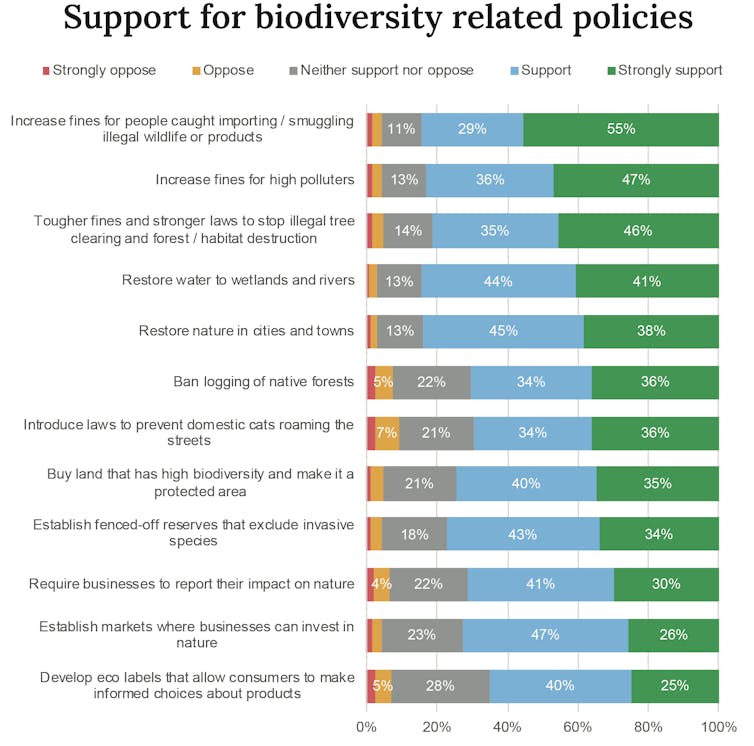Landslide vote: 97% of us want extinctions stopped and 72% want more spent on the environment

Biodiversity matters. We rely on nature for healthy food, clean air and water. Roughly half of the global economy depends on natural systems. But Australia is losing biodiversity at a cracking pace. Over the past 200 years, a species has become extinct every second year on average. This includes one in ten of Australia’s mammal species. Thousands of species that were once common and widespread are now rare.
Halting and reversing species loss requires the support of the whole community. So we wanted to find out what Australians think about these issues and the potential solutions.
We found most of the community strongly supports pro-nature policies, such as ending logging of native forests and requiring businesses to report their impacts on nature. We hope the results in our Biodiversity Council report released today will galvanise support for greater conservation action. Introducing the Biodiversity Council.
Understanding the biodiversity crisis
Biodiversity refers to the richness and diversity of plants, animals and other living things in nature. Australia has one of the most unique and diverse natural environments in the world.
However, the state of the Australian environment is declining. The effects of climate change, land clearing, invasive species, pollution and more are causing irreparable damage.
The pace of loss and its consequences are even greater than previously thought. For example, biodiversity loss reduces the availability of clean water and air, and may limit future discoveries of potential treatments for many diseases and health problems. The loss of wild pollinators threatens the production of food crops globally.
This has led the World Economic Forum to declare biodiversity loss as the third most severe threat humanity will face in the next ten years.
As with climate action, the involvement and support of the wider community is essential to tackling the issue and requires people to take personal action. We also need people to back policies that protect and restore biodiversity.
Australians want action
In late 2022, we conducted an online survey of more than 4,000 people across Australia. We had a representative sample across age, gender and location, benchmarked against Australian census data. We asked people about their attitudes to nature, how much they participated in “pro-biodiversity” behaviours such as native gardening and sustainable consumption, and how concerned they were about biodiversity loss.
We also explored people’s opinions about the state of the environment, government performance and relevant policies.
Many people were not aware of the full extent of biodiversity loss, with 60% believing that the state of the Australian environment is “good” or “very good”.
Yet the vast majority of people still cared deeply for Australia’s environment. More than eight out of ten people were concerned about biodiversity issues (85%) and said it was important that nature in Australia is looked after (83%). As many as six out of ten (63%) people were “very” or “extremely” concerned.
Encouragingly, almost everyone (97%) wanted more action to conserve biodiversity. More than half wanted “a lot” or “a great deal” more action (58%). This shows that even when awareness is limited, people value nature and recognise the importance of protecting our natural environment.
Most people agreed everyone in Australia has a role to play (68%). More than half already engaged in actions to protect nature, such as being a sustainable consumer and managing pets or gardens for nature.
What about policy solutions?
Most of our survey respondents also believe all levels of government are responsible for taking action. Around three-quarters (72%) said more money should be spent on the environment. Only about one in 20 (6%) said less should be spent.
Most Australians were supportive of introducing new policies that could help protect biodiversity. The vast majority of people (80% or higher) support or strongly support:
- restoring water to wetlands and rivers
- increasing fines for people caught smuggling illegal wildlife or products
- restoring nature in cities and towns
- increasing fines for high polluters
- tougher fines and stronger laws to stop illegal habitat destruction and tree clearing.
More than 70% of people also support:
- banning logging in native forests
- introducing laws to prevent domestic cats roaming the streets
- requiring businesses to report their impact on nature
- establishing new protected areas (such as national parks) at places with high biodiversity.

A majority of Australians from all states and territories, political alignments, and regions, and from urban and rural areas supported these policies.
Significantly, very few people opposed these policies (between 3% and 9% across the suite of policy options). The remainder neither supported nor opposed policy action.
This means stronger laws and policies to protect and restore the environment are far less contested among Australians than is often depicted in the media and political debates.
What now?
Policymakers should see our survey results as a green light to take stronger action for nature. Now is the time to start strengthening environmental laws, ceasing native forest logging, and increasing investment in biodiversity protection and restoration.
Around seven in ten Australians in our survey also indicated that nature conservation issues could influence their vote in future elections.
Politicians should take note. Self-identified swinging voters are significantly more concerned than non-swing voters (for example, 73% are “very” or “extremely” concerned about extinction compared with 66% of non-swing voters). They also believe more action is needed (63% believe “a lot” or “a great deal” more action is needed compared with 57% of non-swing voters), and state they are more likely to vote accordingly (80% of swing voters would be influenced by nature conservation in their Federal election votes compared with 73% of non-swing voters).
Australia has a lot to gain from engaging everyone in nature conservation and restoration, and much to lose if we fail.
Liam Smith, Director, BehaviourWorks, Monash Sustainable Development Institute, Monash University; Jaana Dielenberg, University Fellow, Charles Darwin University; Kim Borg, Research Fellow at BehaviourWorks Australia, Monash Sustainable Development Institute, Monash University, and Rachel Morgain, Senior Research Fellow, School of Ecosystem and Forest Sciences, The University of Melbourne
This article is republished from The Conversation under a Creative Commons license. Read the original article.




